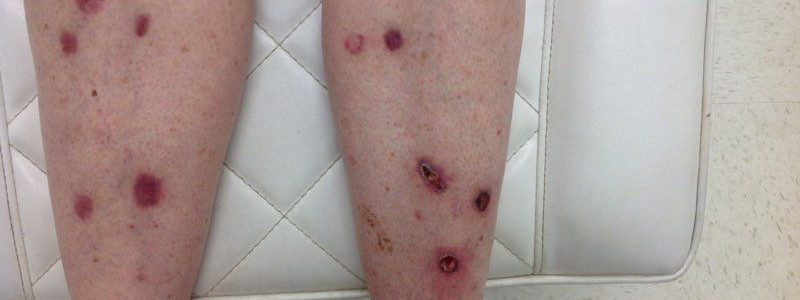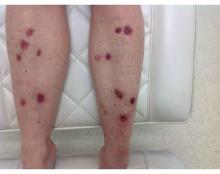Should all skin cancer patients be taking nicotinamide?
In 2014, I began caring for a patient (see photo) who developed over 25 basal cell carcinomas on her lower legs. All of her skin cancers were surgically removed before we initiated preventive therapy. Given the promising results of a 2015 study by Chen et al. on nicotinamide’s protective effects, I started her on oral nicotinamide, 500 mg twice daily. Since beginning supplementation, she has remained free of any new skin cancers for the past two years.
What Is Nicotinamide?
Nicotinamide, also known as niacinamide, is a water-soluble form of vitamin B3. Research shows that it enhances the repair of UV-induced DNA damage. You can find nicotinamide naturally in meat, fish, nuts, grains, and legumes. It plays a crucial role in the glycolysis pathway by generating nicotinamide adenine dinucleotide (NAD) needed for ATP production.
When the body lacks nicotinamide, it can lead to photosensitive dermatitis, diarrhea, and dementia.
Researchers have also studied nicotinamide for its anti-inflammatory benefits. It has been used as an adjunct treatment for rosacea, bullous diseases, acne, and melasma.
Nicotinamide’s Role in Preventing Nonmelanoma Skin Cancers
Nonmelanoma skin cancers primarily result from UV radiation exposure. Supplementing with nicotinamide orally, twice daily, significantly lowers the rate of actinic keratoses and new nonmelanoma skin cancers.
In a phase 3 study published in 2015, researchers conducted a randomized, controlled trial involving 386 patients. Each patient had at least two nonmelanoma skin cancers within the previous five years. Patients who took oral nicotinamide 500 mg twice daily for 12 months reduced their risk of new nonmelanoma skin cancers by 23% compared to those taking placebo.
Recommended Dosage and Safety Considerations
The recommended dose of nicotinamide, available over the counter as Vitamin B3, is 500 mg twice daily.
It’s important not to confuse nicotinamide with niacin (nicotinic acid). Niacin is often used to treat high cholesterol and cardiovascular disease, but it carries different side effects. Long-term nicotinamide use generally does not produce significant side effects. However, patients with end-stage kidney disease or chronic kidney disease should avoid it.
In contrast, niacin can cause elevated liver enzymes, headaches, flushing, and increased blood pressure.
Additionally, nicotinamide crosses the placenta. Because it has not been studied in pregnant populations, it should not be used during pregnancy.
Shop our favorite skincare and more on Derm to Door.com!
Head back to our blog here!



